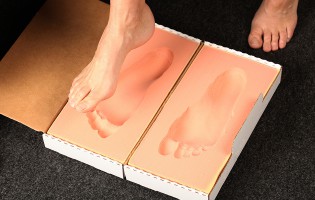
Pelvic Floor Physiotherapy
Pelvic Floor services are available at our Metrotown and Brentwood clinics. Conditions that can be treated by a Physiotherapist trained in Pelvic Floor Physiotherapy are described further below.
Please note: Our Pelvic Floor services are currently offered exclusively for individuals with female reproductive anatomy, based on specific qualifications of our Pelvic Floor Services Provider. We appreciate your understanding.
During the assessment, the Physiotherapist, trained in Pelvic Floor Physiotherapy, will initially take a detailed history. This will be followed by an external exam which commonly includes assessing posture, flexibility, and strength around your low back, hips, and pelvis. Afterwards, an internal exam may be completed to assess the pelvic floor muscles. This can be done vaginally and/or rectally, dependent on symptoms. While an internal exam will likely be recommended, it is not necessary if you are experiencing acute pain or are uncomfortable with the procedure.
Based on the assessment findings, an individualized treatment plan will be implemented. Treatment may include advice and education, exercises, manual therapy, and electrotherapy.
During follow-up sessions, most of the time will be allocated for treatment of your symptoms. While treatment will vary between individuals, common treatments include going through exercises, advice and lifestyle modifications, manual therapy, electrotherapy, and relaxation techniques. There may also be other assessment or tests that the physiotherapist might want to complete during follow-up session. These tests will allow the therapist to get a full picture of your concerns, and to follow the progression of your symptoms.
Q: Does the physiotherapist treat males or post-prostatectomy recovery?
A: Not at this time.
Q: Can I be seen if I am on my period?
A: Yes, as long as you are comfortable with it. The physiotherapist can also complete all other
areas of the assessment, and the internal exam can be completed during a follow-up session if
you prefer.
Q: Are internal exams necessary?
A: Internal exams will likely be recommended depending on your symptoms. This may be done
vaginally and/or rectally. However, if you are in too much pain or are uncomfortable, the
internal exam is not necessary.
Q: Do I need pelvic health therapy?
A: Common conditions that are seen by a pelvic health therapist include:
- Urinary Incontinence (Including stress incontinence, urgency incontinence, and mixed)
- Bladder Urgency (Including over active bladder (OAB) and Nocturia (having to urinate in the night))
- Pelvic girdle pain and other pregnancy related pain
- Constipation
- Fecal incontinence and urgency
- Diastasis Rectus Abdominus (DRA)
- Pain in the vaginal region (Vaginismus / vestibulodynia / Vulvodynia)
- Tailbone pain (Coccydynia)
- Pelvic Organ Prolapse (POP)
- Chronic pelvic pain
- Sexual dysfunction
Q: What will treatment look like?
A: Treatments will be decided between you and the physiotherapist and will depend on your
symptoms and goals. Common treatments include exercises, advice and lifestyle modifications,
manual therapy, electrotherapy, and relaxation techniques.
Q: What training does the therapist have?
A: The physiotherapist has completed the Level 1 pelvic health course with Pelvic Health
Solutions. She has also taken the Rost Therapy course focusing on Pelvic Girdle Pain in
Pregnancy and Postpartum women.
Q: Can I have an internal exam when I am pregnant?
A: Yes, unless your doctor has indicated otherwise
Q: Will an internal exam be done after giving birth?
A: Generally, if an individual is under 6 weeks postpartum, the physiotherapist will not
complete an internal exam. Assessment and treatment may begin prior to 6 weeks post-
partum, however the physiotherapist will likely not complete the internal exam until you have
reached 6 weeks postpartum.
Rates Effective May 23, 2024
| Type | Description | Fee |
|---|---|---|
| Private | Initial Visit | $170 |
| Subsequent Visit | $145 | |
| Biofeedback First Visit | $205 | |
| Biofeedback Re-Assessment | $185 | |
| Biofeedback Subsequent Visit | $165 |
- Including stress incontinence, urgency incontinence, and mixed
- Do you leak small amounts of urine when you cough, laugh, jump, or sneeze?
- Do you leak when you have a strong urge to go to the bathroom?
- Including overactive bladder (OAB) and Nocturia (having to urinate in the night)
- Do you go to the bathroom more than 7 times in a day?
- Do you feel the need to rush to the washroom to empty your bladder?
- Do you need to get up in the middle of the night to empty your bladder?
- Do you go to the bathroom “just is case”?
- Are you pregnant with pain in your low back, pelvis (including pubic bone, sacrum, and tailbone), and hips?
- Do you have pain when in a prolonged position?
- Do you have pain in your wrists or hands during your pregnancy?
- Do you have fewer than 3 bowel movements per week?
- Do you need to strain when on the toilet?
- Do you leak stool when you cough, sneeze, or jump?
- Do you have strong and urges to empty your stools?
- When you get up from lying do you find your belly bulges?
- Has it been difficult to regain abdominal strength since giving birth?
- Do you have pain in or around your vagina?
- Do you experience discomfort when having intercourse?
- Do you find it uncomfortable to sit for long periods of time?
- Do you have pain around your tailbone region?
- Do you feel a bulging or “heaviness” in your vagina
- Have you seen any changes to your bladder or bowel function
- Have you had pain around your pelvis, genitals, and/or groin that has lasted over 3 months?
- Do you experience discomfort with intercourse?
- Have you been tested negative for other medical concerns?
- Do you have discomfort during or after intercourse?
Studies have shown there is an association between low back pain and pelvic symptoms, particularly urinary incontinence (Smith et al. 2006, Eliasson et al. 2008). In addition, Dufour and Vandyken (2016) found a high correlation between low back pain and an overactive pelvic floor. While not everyone who has back pain has incontinence or pelvic floor issues, it is an important step in the assessment process to either rule in or out.
Thus, as practitioners we should remember to screen for pelvic floor concerns when assessing and treating low back pain. This can be done through asking some of the common questions as outlined at the beginning of the document.
























Follow Us!
& Stay Up To Date
BLOG